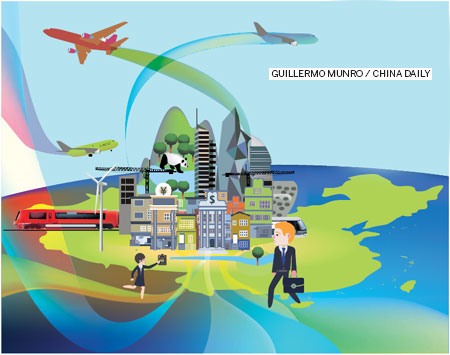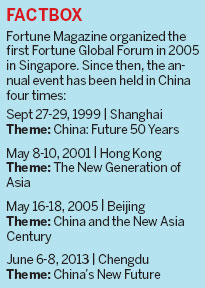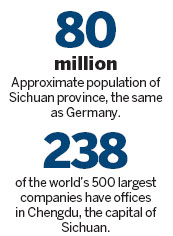Finding China's new future
Updated: 2013-06-06 08:02
By Zheng Yangpeng (China Daily)
|
||||||||


Major global forum in Chengdu reflects growing economic clout of western part of the country, Zheng Yangpeng reports.
As the 2013 Fortune Global Forum opens in Chengdu on Thursday, the world's spotlight will shine on the southwest megapolis, where more than 600 business leaders from world-class corporations will gather.
This time, the city and its province, renowned for giant pandas and spicy cuisine, are determined to impress the world with economic and technological vibrancy.
"West China has proved to be a major draw for leaders from all over the world. We are pleased to bring that focus to Chengdu, a great city that is the center of the region's story of development," Andrew Serwer, Fortune's managing editor, said at a news conference a few days ahead of the forum.
This is the fourth time that the Fortune Global Forum has set up stage in China, after Shanghai (1999), Hong Kong (2001) and Beijing (2005).
Fortune's choices offer a clue on how the world's attention quietly shifted to China.
Back in 1999, when the prestigious world business summit convened in China for the first time in Shanghai, the nation was still reeling from the aftermath of the Asian financial crisis. It was not a member of the World Trade Organization and was the seventh-largest economy in the world, after Italy. Many foreign corporations had just entered China, mostly in Shanghai.
They were lured by the potential opportunities of the world's most populous country, but were still figuring out the sustainability of the country's economic growth and what the market of 1.3 billion people meant for their marketing strategy.

The forum has since witnessed the trajectory of the country's growth: China joined the World Trade Organization in 2001. This was followed by several years of an infrastructure construction boom in China's western regions under the campaign of "Go West".
Chengdu, as one of the few large cities in China's west, has benefited from the campaign and the west's deepening exposure to the world's economy.
In 2012, Chengdu's GDP grew to 813.9 billion yuan ($132 million), 10 times that of 2002, making it the third-largest economy of China's 15 sub-provincial cities after Guangzhou and Shenzhen. It became a self-sustaining economy, and a magnet for international companies as well as high-caliber talent.
Ge Honglin, mayor of Chengdu, said that before 2006 most of the graduates would go to first-tier cities like Shanghai and Beijing to seek jobs. Now more and more stay in Chengdu and work for local companies.
"Fortune's choices over the years reflected the wealth and growth shift within China, and Chengdu is an embodiment of the shift," said Cao Heping, an economic professor with Peking University.
Serwer also saw that trend. "Western companies looked to China as a place of outsourcing and production. Now these trends are certainly continuing, but another important part, the consumer part, is gaining more weight," Serwer said.
This, combined with the dramatic growth of China's western regions and its urbanization, constitute the content of the theme for the forum: China's new future.
Unique way
Though Chengdu's economic success is admirable, its growth model is hardly imitable.
As the capital of Sichuan, the city enjoys several conditions that few other Chinese western cities can claim. Sichuan, if counted independently, is a major economy. It has a land area of 486,000 sq km, the equivalent of Spain, and a population of more than 80 million, the same as Germany.
This vast land has earned its reputation as a self-sustaining economy with a distinctive culture. The abundance of agricultural products available in Chengdu's surrounding areas earned it the name Tianfu Zhiguo, kingdom of paradise.
Many CEOs of large domestic and international corporations set up their regional headquarters in Chengdu because it is a vast, and largely untapped market.
No wonder that 238 out of the 500 largest world companies have offices here. For them, an office here represents the strategic importance they attach to the market.
And in the era of globalization, Chengdu governments have spent large amounts of money to improve transport conditions in an effort to build itself into a national, and international logistics hub. Now Chengdu's airport boasts the fourth-largest handling capacity in China, just behind Beijing, Shanghai and Guangzhou. Global shipping giants like United Parcel Service Inc, FedEx Corp and DHL have built regional transfer centers in Chengdu.
And the booming electronic manufacturing industries have provided goods for transport. One out of every two laptop microchips, and two-thirds of the world's iPads are produced in Chengdu.
Trade and geographical advantages are important but most important of all is a vibrant entrepreneurial spirit.
For example, Gu Rui is chief marketing officer of a startup that developed a camera application from scratch.
Within just four years, it has grown to be China's most popular camera app for smartphones. Of course, he experienced many setbacks in the process. But looking ahead, he is still not complacent. He said the biggest challenge for his company is to transfer the app from a "tool" to a "platform" that helps its users manage their photo albums and share photos with others, much like the Facebook's Instagram.
It is this unyielding spirit of entrepreneurship that kept his company, and this city, moving forward. It is the very spirit that the country needs to march to the next growth stage.
(China Daily USA 06/06/2013 page10)

 Michelle lays roses at site along Berlin Wall
Michelle lays roses at site along Berlin Wall
 Historic space lecture in Tiangong-1 commences
Historic space lecture in Tiangong-1 commences
 'Sopranos' Star James Gandolfini dead at 51
'Sopranos' Star James Gandolfini dead at 51
 UN: Number of refugees hits 18-year high
UN: Number of refugees hits 18-year high
 Slide: Jet exercises from aircraft carrier
Slide: Jet exercises from aircraft carrier
 Talks establish fishery hotline
Talks establish fishery hotline
 Foreign buyers eye Chinese drones
Foreign buyers eye Chinese drones
 UN chief hails China's peacekeepers
UN chief hails China's peacekeepers
Most Viewed
Editor's Picks

|

|

|

|

|

|
Today's Top News
Shenzhou X astronaut gives lecture today
US told to reassess duties on Chinese paper
Chinese seek greater share of satellite market
Russia rejects Obama's nuke cut proposal
US immigration bill sees Senate breakthrough
Brazilian cities revoke fare hikes
Moody's warns on China's local govt debt
Air quality in major cities drops in May
US Weekly

|

|







